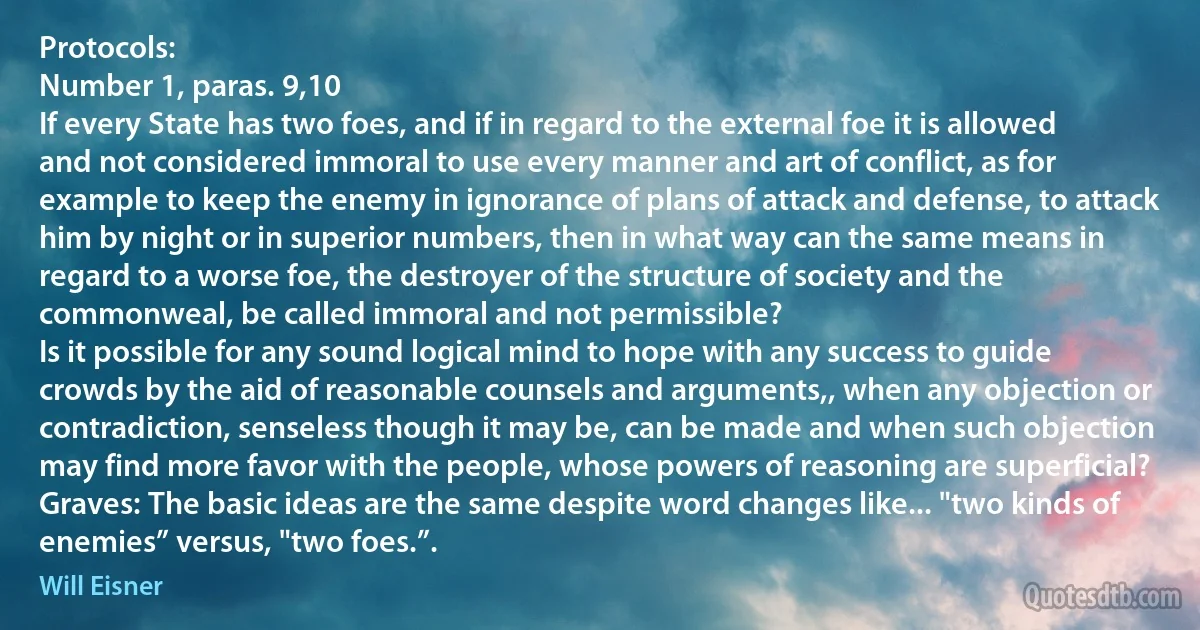
Protocols: Number 1, paras. 9,10 If every State has two foes, and if in regard to the external foe it is allowed and not considered immoral to use every manner and art of conflict, as for example to keep the enemy in ignorance of plans of attack and defense, to attack him by night or in superior numbers, then in what way can the same means in regard to a worse foe, the destroyer of the structure of society and the commonweal, be called immoral and not permissible? Is it possible for any sound logical mind to hope with any success to guide crowds by the aid of reasonable counsels and arguments,, when any objection or contradiction, senseless though it may be, can be made and when such objection may find more favor with the people, whose powers of reasoning are superficial? Graves: The basic ideas are the same despite word changes like... "two kinds of enemies” versus, "two foes.”.
Will EisnerRelated topics
art attack basic contradiction enemy example favor find foe guide hope ignorance mind night number objection people possible sound state success superficial superior use way word worse meansRelated quotes
Spinoza is a highly systematic thinker, but still I do not think I can offer a single key for all things Spinozistic. Personally, one thing which got me excited about Spinoza is his philosophical boldness, i. e., his willingness to pursue philosophical exploration as far as he can, making very little concessions to commonly accepted beliefs and norms. In terms of content, I take his attempt to conceive of God, nature, and ethics in a manner that is free from anthropomorphism and anthropocentric illusions as one of the deepest elements of his philosophical thinking. A closely related issue is his advocacy of actual infinity (an issue that has been mostly neglected in recent literature). Finally, the very attempt to do philosophy systematically (rather than rely on fragmented and disassociated intuitions) and transparently (laying bare the logical structure of his arguments) commands my respect, indeed admiration.

Baruch Spinoza
Harry Dresden: There's power in the night. There's terror in the darkness. Despite all our accumulated history, learning, and experience, we remember. We remember times when we were too small to reach the light switch on the wall, and when the darkness itself was enough to make us cry out in fear. Get a good ways out from civilization-say, miles and miles away on a lightless lake-and the darkness is there, waiting. Twilight means more than just time to call the children in from playing outside. Fading light means more than just the end of another day. Night is when terrible things emerge from their sleep and seek soft flesh and hot blood. Night is when unseen beings with no regard for what our people have built and no place in what we have deemed the natural order look in at our world from outside, and think dark and alien thoughts. And sometimes, just sometimes, they do things.

Jim Butcher
.. I will endeavour to make clear to men of good will what the word 'material' means with regard to painting and that, without the material substance of paint, a painting is not a work of art but merely a decorative object, or rather, if it deals with an invented painting, the value of the image resides in its spiritual content.
In order to be a work of art, a painting must be very well painted and the good quality of the paint depends completely on the material substance of the paint with which it is executed. This matter, which constitutes the substance of painting, is composed of two elements which are equally important and absolutely inseparable: physical substance and metaphysical substance. These two elements complete each other reciprocally and when they are of a superior quality, create a masterpiece by way of their absolute harmony.

Giorgio de Chirico
Or indeed we may say again, it is in what I called Portrait-painting, delineating of men and things, especially of men, that Shakspeare is great. All the greatness of the man comes out decisively here. It is unexampled, I think, that calm creative perspicacity of Shakspeare. The thing he looks at reveals not this or that face of it, but its inmost heart and generic secret: it dissolves itself as in light before him, so that he discerns the perfect structure of it. Creative, we said: poetic creation, what is this too but seeing the thing sufficiently? The word that will describe the thing, follows of itself from such clear intense sight of the thing. And is not Shakspeare's morality, his valour, candour, tolerance, truthfulness; his whole victorious strength and greatness, which can triumph over such obstructions, visible there too? Great as the world!

Thomas Carlyle
My father was as well aware as anyone that Christians do not, in general, undergo the demoralizing consequences which seem inherent in such a creed, in the manner or to the extent which might have been expected from it. The same slovenliness of thought, and subjection of the reason to fears, wishes, and affections, which enable them to accept a theory involving a contradiction in terms, prevents them from perceiving the logical consequences of the theory. Such is the facility with which mankind believe at one and the same time things inconsistent with one another, and so few are those who draw from what they receive as truths, any consequences but those recommended to them by their feelings, that multitudes have held the undoubting belief in an Omnipotent Author of Hell, and have nevertheless identified that being with the best conception they were able to form of perfect goodness.

John Stuart Mill
